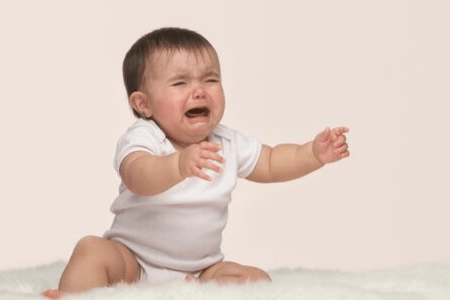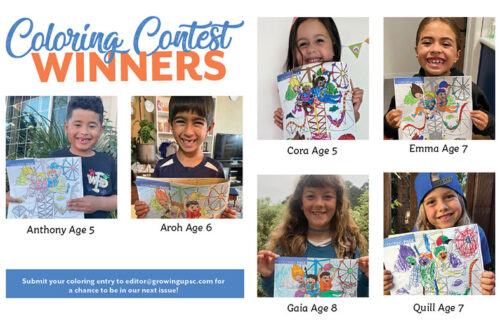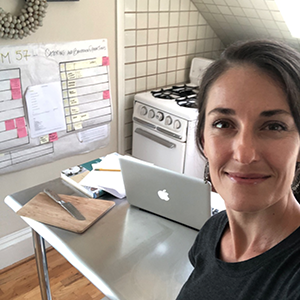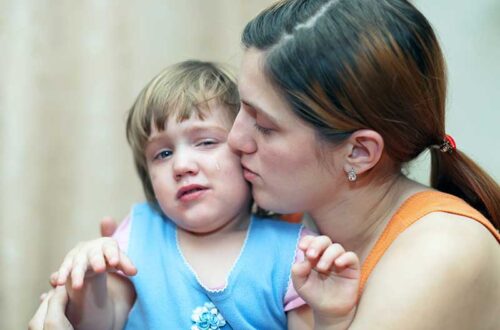When Saying Good-bye is Hard for Babies (and Parents)
Ask Nicole: October 2019
By Nicole M. Young, MSW
You wouldn’t know it now, but my daughter cried constantly when she was a baby. First, she had colic. Then she cried whenever I was out of her sight. This made it extremely hard to drop her off at child care, and I often ended up crying just as much as my daughter. Our wise child care provider suggested I give my daughter something that smelled like me when saying good-bye, so she could be reminded of me throughout the day.

For many months, I packed the nightshirt I’d worn the night before into the diaper bag each morning, then gave it to my daughter as I kissed her good-bye. It helped, and it became a special part of our good-bye routine that my daughter came to depend upon. After awhile, it didn’t matter if I’d worn the shirt – any soft, white T-shirt symbolized comfort and security. I’ll always be grateful for that simple tip that got us through many teary good-byes.
This monthly column provides tips for anyone who’s helping raise children, based on the world-renowned Triple P – Positive Parenting Program, available to families in Santa Cruz County. If you have a question or idea for a future column, please email me at [email protected].
Dear Nicole,
My wife and I recently adopted our first baby. We’re both excited, nervous, and clueless. Our daughter is 8-months old and usually easy-going, but lately she gets upset and cries when I drop her off at child care. It’s a terrible feeling to leave her when she’s crying and reaching out for me. Our child care provider says she’s fine once I leave, but should I be worried?
–Tessa
Dear Tessa,
Great question! It’s common for babies to go through a phase where they become upset and cry during separations. This is often called “separation anxiety” and is usually temporary. It can start as early as 4-months old, peak around 1-year old, then start to fade as children learn that their parents exist even if they can’t see them and that they will return after a separation. Here are some tips to try:
Spend quality time together
This is the first positive parenting strategy to use in any situation, with any child, at every stage of life. Talk, read, sing, make eye contact, hold, cuddle, and play with your baby, even if it’s only for a few minutes at a time. This kind of brief, frequent quality time builds warm, loving relationships and will help your baby feel safe and secure.
Create a good-bye routine
Predictable routines help children feel safe and teaches them to prepare for separations. For example:
- Tell your baby when it’s almost time to say good-bye – “Mommy [or Daddy] needs to leave in 5 minutes.”
- Do something special as you say good-bye – e.g. blow kisses, rub noses, sing a song, or hug.
- As you say your final good-bye, give your baby a “transitional object,” such as a toy, blanket, or other item from home that reminds them of you while you’re apart.
Respond calmly if your baby gets upset
Babies often react to their parents’ emotions, even if they don’t understand or speak words. Try to stay calm and relaxed as you say good-bye and reassure your child that you’ll be back. It might not stop the crying, but can help prevent it from escalating.
Create a routine for reconnecting
Babies often cry, turn away, or avoid their parents when they return, too. If this happens, it’s not a sign of rejection. Babies may need time to adjust to seeing their parents after being apart. Stay close by and talk in a calm, caring voice so she knows you’re there, even if she doesn’t want to look at you or be held. Watch her face and body for signs she’s ready to be picked up or hugged.
Take care of yourself
Separating from and reconnecting with children (especially crying babies) can be an emotional roller coaster for parents. Give yourself time and permission to feel your emotions, then practice self-care. Take a walk, listen to music, get a cup of coffee or tea, talk to someone, take deep breaths – whatever will help you feel calm and ready to face the day.
Final Thoughts
Saying good-bye is hard for many children and parents, no matter how old they are. Developing routines for separating and reconnecting helps children learn how to handle their feelings about saying good-bye, which helps prepare them to cope with changes and transitions throughout life.
Nicole Young is the mother of two children, ages 15 and 19, who also manages Santa Cruz County’s Triple P – Positive Parenting Program, the world’s leading positive parenting program. Scientifically proven, Triple P is made available locally by First 5 Santa Cruz County, the Santa Cruz County Health Services Agency (Mental Health Services Act) and the Santa Cruz County Human Services Department. To find a Triple P parenting class or practitioner, visit http://triplep.first5scc.org, www.facebook.com/triplepscc or contact First 5 Santa Cruz County at 465-2217 or [email protected].






